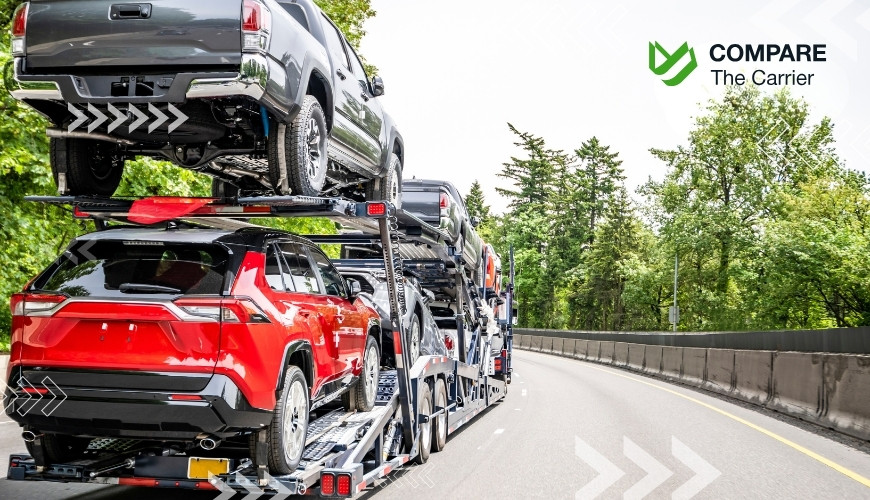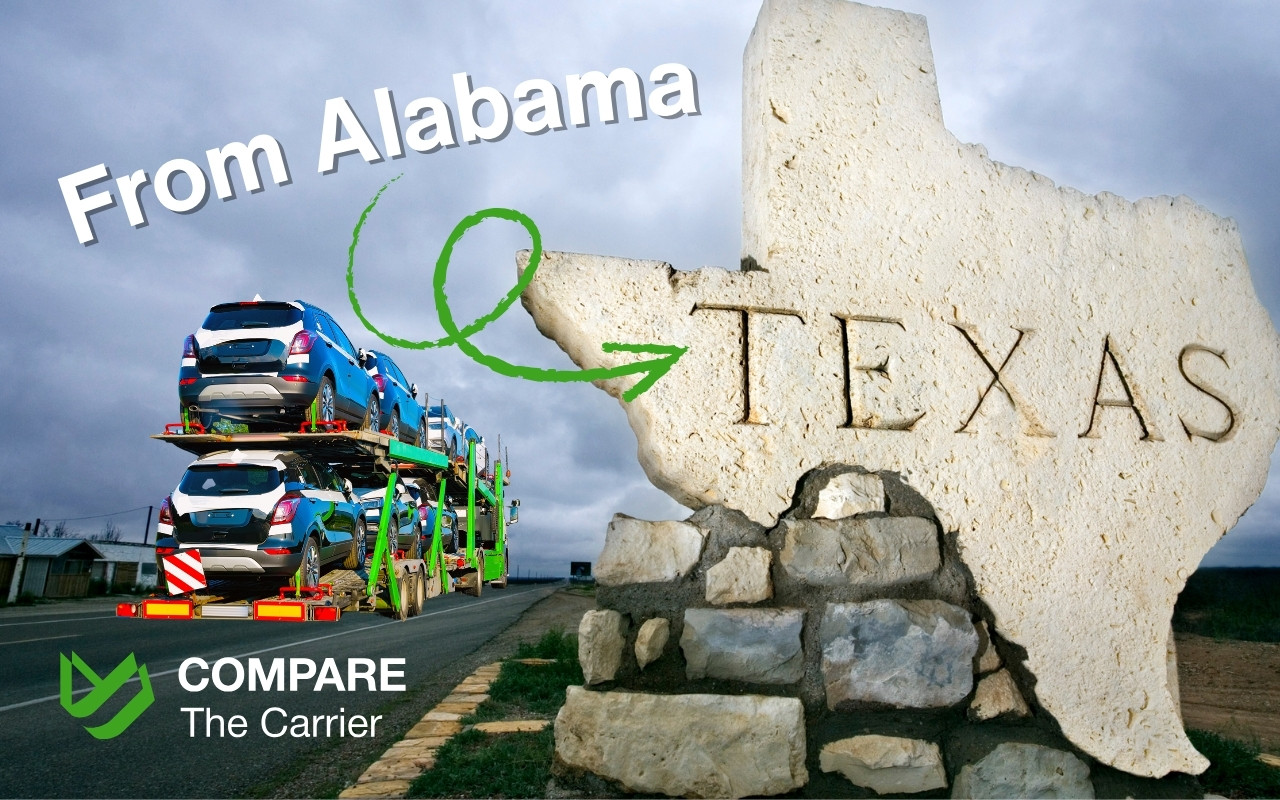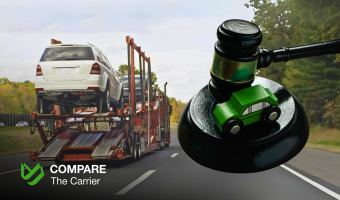Rather than racking up 700-plus miles, use a professional Alabama to Texas auto transport service and get peace of mind by booking it through Compare The Carrier.
In this guide, we’ll cover the following topics:
Why Ship a Car from Alabama to Texas?
Texas has emerged as one of America’s top relocation destinations in recent years. In fact, Texas continues to be one of the most popular states for movers, thanks to its affordable living, booming job market, and lack of state income tax.
With major companies expanding in cities like Austin and Dallas, and a strong economy across the state, many individuals and families from Alabama are heading west in search of new opportunities. According to moving industry data, Texas is attracting people from all over the U.S., leading 2026 inbound migration trends. This means plenty of Alabamians – from professionals chasing tech jobs, to military families reassigned to Texas bases, to students enrolling in Texas universities – are making the trek.
But driving ~800 miles from Alabama to Texas isn’t always the best option. Even with relatively cheap Southern gas prices (the Texas average is about $2.75/gal as of mid-2026), a road trip from AL to TX means dozens of gallons of fuel, possibly an overnight stop, and significant wear-and-tear on your car.
You’re looking at 10-14 hours on the road, not counting rest, a tiring journey that can rack up costs and risks (weather, accidents, etc.). Factor in the mileage depreciation on your vehicle and the value of your time, and it’s clear why so many are choosing professional Alabama to Texas auto transport instead.
Every year, millions of vehicles are shipped across state lines via professional carriers. From Birmingham to Houston or Montgomery to Austin, more people are turning to auto transport services to move their cars safely and efficiently.
When done right, car shipping from Alabama to Texas is convenient, cost-effective, and stress-free. But doing it right means understanding the process, the costs, and how to select a trustworthy carrier. Let’s break it all down step by step so you can make an informed decision and ensure your Alabama-to-Texas car shipment goes smoothly.

How Auto Transport Works from Alabama to Texas
Shipping a car from Alabama to Texas is a straightforward process when you know the steps involved. While the distance (roughly 600–900 miles, depending on your route) may seem daunting, professional auto transport companies handle these interstate routes every day. Here’s how it works:
1. Get a Quote
Start by requesting a quote through an online vehicle shipping calculator on a comparison platform like CompareTheCarrier.com. You’ll provide basic details such as:
- Pickup location in Alabama (ZIP or city)
- Delivery location in Texas (ZIP or city)
- Vehicle make, model, and condition (operable or not)
- Preferred transport type (open or enclosed carrier)
Based on this, you’ll get instant estimates from licensed carriers, allowing you to compare Alabama to Texas car shipping costs side by side. This step is free and helps you gauge the price range for your specific move.
2. Book Your Carrier
Once you have quotes, choose the carrier or broker that best fits your needs—considering price, reviews, insurance coverage, and scheduling. (We’ll discuss the broker vs. carrier decision in the next section.) When you book, you’ll schedule a pickup time frame and confirm the details.
Reputable carriers will be registered with the FMCSA and carry proper insurance. Platforms like CompareTheCarrier only match you with vetted, licensed transporters, so you can book with confidence.
3. Schedule Vehicle Pickup in Alabama
The carrier will arrange a pickup window (often within 1–5 business days of booking). You or your designated contact will meet the truck driver at the appointed time. Before loading, the driver will inspect your car and note any existing damage on a Bill of Lading (inspection report).
This document is like a receipt for the shipment and protects both you and the carrier by documenting the car’s condition pre-transport. Once both parties sign off, your car is loaded onto the trailer.
4. Vehicle in Transit
Now your car is on its way west! The carrier will transport it across state lines, typically along major routes (I-20 or I-10) through Mississippi and Louisiana into Texas. You can expect updates during transit – many carriers offer tracking or driver communications so you know the progress. Car shipping from Alabama to Texas usually takes just a few days given the distance.
On average, the journey from pickup to drop-off ranges from 2 to 5 days, depending on the route, the number of stops, and any unforeseen delays (such as weather or traffic). Professional carriers can cover about 500 miles per day, so an 800-mile trip is often completed in under a week. With a well-coordinated shipment, you’ll avoid putting any extra miles on your car while it’s efficiently hauled to your destination.
5. Delivery in Texas
When the truck nears the destination, the carrier will contact you to arrange the drop-off. Typically, you’ll get a call a day or a few hours in advance to confirm the time and exact location. If you opted for door-to-door delivery, the driver will bring the vehicle as close to your specified address as possible (keeping in mind large transport trucks need accessible roads or parking lots).
In cases where your neighborhood has restrictions (narrow streets, low-hanging trees, gated community rules), you might agree on a nearby location like a large parking lot for the drop-off.
Upon arrival, another inspection takes place. The driver will review the Bill of Lading and walk around the car with you to compare its delivered condition to the notes from pickup. This is when you’ll check for any unexpected damage or issues. (This is where your pre-shipping photos come in handy.) Everything look good? You’ll sign the Bill of Lading to acknowledge safe delivery, handle any remaining payment due, and receive your keys. In most cases, the entire delivery process takes under 30 minutes.
From start to finish, a reputable Alabama–Texas vehicle transport typically runs like clockwork. The entire process can be as quick as just a few days and spares you the hassle of a long drive. With the right shipping partner, it’s a stress-free experience that saves you time, money, and mechanical wear on your car.
Next, let’s look at who that shipping partner might be – should you book directly with a carrier or use an auto transport broker?
Broker vs. Carrier: What’s the Best Way to Ship from AL to TX?
When arranging auto transport from Alabama to Texas, you’ll encounter two types of service providers: carriers and brokers.
Using a reputable auto transport broker or platform can simplify your Alabama-to-Texas move. A broker coordinates with vetted carriers on your behalf, ensuring you find a truck heading your way without the legwork of contacting individual companies.
Understanding the difference – and which to use for your situation – is key to a smooth shipment. Both approaches will ultimately get your car from AL to TX, but they operate differently:
Carrier: The Trucking Company
A carrier is the company that owns the trucks and employs the drivers who physically transport your vehicle. If you book directly with a carrier, you’re effectively cutting out the middleman and working with the people moving your car. This can have benefits, but also some limitations.
Pros:
- Direct communication: You can talk straight to the driver or dispatch for updates, pick-up times, etc. There’s no intermediary; it’s a one-on-one relationship.
- Potentially lower cost: By going direct, you avoid any broker fee or commission. In some cases, this means a slightly lower price since you’re not paying for a middleman service.
- Control over timing: You might coordinate specifics of pickup/delivery more directly. If you find a carrier with an open slot on the Alabama–Texas route, you’re dealing with them on scheduling.
Cons:
- Limited availability & routes: An individual carrier only has so many trucks and covers certain routes. If their trucks servicing Alabama or Texas are booked up or not in position, you might wait longer for pickup. You’ll need to find a carrier that specifically runs the AL→TX lane.
- Must vet them yourself: When going direct, the due diligence is on you. You should verify the carrier’s FMCSA license, insurance, safety record, etc. This can be time-consuming if you’re not familiar with the process.
- No instant comparison: You’ll have to call or email multiple carriers one by one to compare quotes and timelines. This can be a hassle, and you might miss out on a better deal that a broader search (via broker) would reveal.
Broker: The Logistics Coordinator
A broker is essentially a middleman who arranges shipments by connecting customers with carriers. Brokers do not own trucks; instead, they maintain a network of pre-screened carriers and find one to carry out your transport for a fee. A good broker acts like your logistics agent, handling the legwork of finding a truck and coordinating the details.
Pros:
- Access to multiple carriers: Brokers have a nationwide network of trucking partners. For a route like Alabama to Texas, a broker can quickly identify which carriers are heading that way with available space. This often means faster scheduling and more options.
- Price competition: By getting bids from various carriers, brokers can secure competitive pricing. Carriers compete for the job, which can drive down your cost. You’re effectively getting the market rate at that moment, rather than a single carrier’s quote.
- Convenience & support: A broker handles all the coordination – dispatching the carrier, verifying insurance, and often providing customer support throughout. If something goes wrong (e.g. a truck breaks down), a broker can swiftly reassign your shipment to another carrier from their network.
- Expert vetting: Reputable brokers thoroughly vet their carriers. They check FMCSA registration, insurance coverage, and performance history. This means you’re only matched with licensed, insured carriers that meet industry standards, rather than taking a gamble on an unknown company.
Cons:
- Broker fee: Brokers charge a fee or commission for their service, which is typically baked into your quote. While they often save you money overall, part of your payment goes to the broker for arranging the shipment.
- Quality varies: Not all brokers are equal. A shady broker might quote extremely low to get your booking, then fail to find a carrier at that price (leading to delays or upsells). It’s important to use a trusted, highly rated broker or platform to avoid potential scams.
Which Is Better for Shipping a Car from Alabama to Texas?
The platform vets both brokers and carriers in its network, so you get multiple competitive quotes from trusted companies, all in one place. Essentially, you get the flexibility and savings of a broker with the peace of mind of working only with thoroughly screened carriers. In fact, for an ~800-mile trip from AL to TX, going through a comparison platform often yields better pricing and faster pickup than trying to find a single carrier on your own.
Bottom line: if you’re new to car shipping or want to save time, a broker/platform is typically the way to go. If you already have a favorite carrier and they serve Alabama→Texas, then direct could work too. Now, let’s talk dollars and cents – what will it cost to ship your car to Texas?
Car Shipping Cost from Alabama to Texas
The cost of shipping a car from Alabama to Texas can vary, but it helps to know the typical price range as you plan. Generally speaking, for a standard sedan traveling ~800 miles, you can expect to pay roughly around $800 to $1,300 for an open carrier transport. Several factors influence the final price (we’ll detail those next), but here’s a quick look at typical rates:
For example, one national auto transport service estimates an average of $861 – $1,288 to ship a car from Alabama to Texas. Another industry analysis found similar shipments ranging from about $1,018 to $1,448 on average. Your actual quote may fall slightly below or above these figures based on your specific route and needs. To help with budgeting, here’s a breakdown of estimated cost ranges.
Price Examples (Estimates for 2026):
To give you a clearer picture, here are some sample average rates for vehicles depending on the vehicle type and transportation method.
| Vehicle Type | Transport Type | Estimated Cost Range |
| Average Sedan | Open Carrier | $800 – $1,100 |
| Standard SUV / Small Pickup | Open Carrier | $1,300 – $1,500 |
| Luxury or Classic Car | Enclosed Trailer | $1,300 – $1,800 |
Disclaimer: These are recent industry averages provided for budgeting purposes based on FMCSA carrier data and seasonal averages. Actual rates are subject to fluctuations in fuel prices, carrier availability, and seasonal demand.
And below you can see a table with auto shipping from Alabama to Texas rates estimates for specific locations:
| Origin (Alabama) | Destination (Texas) | Distance (mi) | Est. Shipping Cost |
| Huntsville, AL | Houston, TX | 765 | $880–$1,353 |
| Huntsville, AL | San Antonio, TX | 959 | $891–$1,424 |
| Huntsville, AL | Dallas, TX | 665 | $894–$1,210 |
| Huntsville, AL | Austin, TX | 859 | $887–$1,437 |
| Huntsville, AL | Fort Worth, TX | 697 | $865–$1,188 |
| Montgomery, AL | Houston, TX | 633 | $852–$1,133 |
| Montgomery, AL | San Antonio, TX | 828 | $911–$1,362 |
| Montgomery, AL | Dallas, TX | 650 | $825–$1,259 |
| Montgomery, AL | Austin, TX | 797 | $907–$1,295 |
| Montgomery, AL | Fort Worth, TX | 680 | $856–$1,288 |
| Birmingham, AL | Houston, TX | 666 | $851–$1,161 |
| Birmingham, AL | San Antonio, TX | 861 | $887–$1,395 |
| Birmingham, AL | Dallas, TX | 638 | $886–$1,241 |
| Birmingham, AL | Austin, TX | 785 | $953–$1,363 |
| Birmingham, AL | Fort Worth, TX | 671 | $851–$1,259 |
| Mobile, AL | Houston, TX | 467 | $713–$1,038 |
| Mobile, AL | San Antonio, TX | 663 | $834–$1,284 |
| Mobile, AL | Dallas, TX | 588 | $784–$1,130 |
| Mobile, AL | Austin, TX | 631 | $886–$1,252 |
| Mobile, AL | Fort Worth, TX | 623 | $843–$1,174 |
| Tuscaloosa, AL | Houston, TX | 615 | $843–$1,115 |
| Tuscaloosa, AL | San Antonio, TX | 809 | $877–$1,439 |
| Tuscaloosa, AL | Dallas, TX | 585 | $776–$1,084 |
| Tuscaloosa, AL | Austin, TX | 734 | $853–$1,264 |
| Tuscaloosa, AL | Fort Worth, TX | 620 | $802–$1,127 |
Disclaimer: These are recent industry averages provided for budgeting purposes based on FMCSA carrier data and seasonal averages. Actual rates are subject to fluctuations in fuel prices, carrier availability, and seasonal demand.
Use our Calculator for Real-Time Quotes
While the estimates above are a great starting point, the only way to know your exact cost is to use a modern auto shipping calculator. The transport market is dynamic, with prices changing weekly.
An instant online calculator, like the one offered by Compare The Carrier, gives you a free, no-obligation quote based on today’s market rates. You can view live pricing from a network of vetted carriers without having to provide sensitive personal information upfront, allowing you to budget accurately and book with confidence.
Now that you have a ballpark idea of cost, let’s break down exactly why your quote might be higher or lower. Understanding the pricing factors will help you make informed decisions to control your Alabama-to-Texas shipping costs.
Key Factors That Influence the Cost of Shipping from Alabama to Texas
When budgeting for auto transport, it’s important to know what goes into the price. Carriers calculate your Alabama to Texas shipping quote based on several key factors. Here are the main variables that can raise or lower the cost:
1. Vehicle Type & Size
The size and weight of your vehicle are major pricing factors. Larger or heavier vehicles (like SUVs, full-size trucks, or vans) take up more space on the carrier and add more weight, so carriers charge more to compensate. For example, shipping a Chevy Tahoe will cost more than a Honda Civic on the same route. Similarly, modified vehicles (lift kits, oversized tires) or non-running cars (which might require a winch) can incur extra fees because they need special handling. In short: bigger/heavier = higher cost.
2. Transport Type: Open vs. Enclosed
Your choice of transport trailer impacts price significantly. Open transport is the standard – your car will be on an open-air trailer along with 6–10 other vehicles. It’s very efficient, but vehicles are exposed to weather and road dust. Enclosed transport means your car rides in a covered trailer (usually with only 1–5 other cars) shielded from the elements. Enclosed shipping offers premium protection but typically costs 30–50% more than open on the Alabama–Texas route. If you’re shipping a regular daily driver, open is usually the best value. High-value or rare cars may justify the extra cost of enclosed. (More on open vs enclosed later.)
3. Pickup and Delivery Locations
Where exactly in Alabama and Texas you’re shipping between will affect the price. Major metro areas and routes are cheaper because carriers travel there frequently and can easily fill their trucks. For instance, shipping from Birmingham, AL to Dallas, TX might be a bit cheaper than from a small town in rural Alabama to Amarillo, TX. Remote or less-populated locations often require carriers to go out of their main route, which can mean a surcharge. If possible, meeting the truck in a major city or along an interstate corridor can sometimes save you money versus very rural door-to-door service.
4. Season and Timing
The time of year you ship plays a role. Summer is typically busy with people moving, so demand for carriers is high – prices can peak in July/August. Late spring and early fall also see spikes (e.g. “snowbirds” moving vehicles, college students heading to campus, etc.). If you have flexibility, avoiding peak moving season could lower your quote. Additionally, how urgent your shipment is can affect cost. Last-minute or expedited shipments (needing pickup in a day or two) might cost more than bookings made a few weeks ahead. Carriers sometimes give better rates if they can schedule efficiently, so a little flexibility on dates can translate to savings.
5. Fuel Prices & Route Conditions
Fuel is one of the biggest expenses for any carrier. When fuel prices rise, those costs are passed on in quotes via fuel surcharges. Fortunately, gas and diesel prices in mid-2026 have been relatively moderate – especially in the South – but it’s something to watch. For context, diesel prices on routes through the Southeast and Texas have been stable, keeping transport costs in check.
Additionally, any special route conditions can influence cost or timing. Major highway construction, severe weather (like Gulf Coast storms or flooding), or detours can introduce extra miles or delays, which in turn affect pricing. Carriers factor in known road challenges when quoting a route.
6. Speed of Delivery
Do you need your car delivered by a specific date? Expedited or guaranteed delivery services are available but at a premium. If you require a very narrow pickup window or need the car in Texas ASAP (perhaps for a job start date), the carrier may have to dedicate resources or even send a special single-car truck. This will raise your cost. On the other hand, if you’re flexible by a few days on pickup or drop-off, you’ll usually get a better rate. Carriers can coordinate your shipment with others and optimize their routes if you’re not demanding lightning-fast turnaround.
7. Insurance and Extra Services
All reputable carriers include basic cargo insurance in the quote – this is required by law. However, the coverage might only be up to a certain amount (say $100,000). If you’re shipping an especially valuable vehicle, you might consider purchasing additional coverage, which can add to the cost. Some shippers also offer optional add-ons like top-load service (your car only rides on the top deck of an open carrier to avoid any dripping from vehicles above – useful for convertibles) or GPS tracking updates.
Door-to-door service is standard for most quotes, but if a carrier had to use a storage terminal or hold your car for a time, there could be storage fees. Be sure to confirm what’s included in your quote and what’s not.
For the smoothest experience, understanding these factors is half the battle. The other half is preparing your vehicle properly for shipment. We’ll cover that next.
Modern auto transport trucks ensure vehicles arrive safely, whether they’re traveling 100 miles or 1,000 miles. By comparing quotes and planning ahead, you can balance cost, timing, and service quality for your Alabama-Texas car shipment.
Step-by-Step Guide to Getting Your Car Ready for Shipping
Properly preparing your vehicle for long-distance shipping is essential – it helps avoid delays, prevents damage, and ensures a smoother hand-off on both ends. Whether your car is headed from Alabama to the Texas Panhandle or down to the Gulf Coast, take these steps before pickup:
1. Wash Your Car Thoroughly
Give your car a good wash, both exterior and a quick interior clean-out. A clean exterior makes it easy to do a quality inspection with the driver at pickup – dirt or mud can hide scratches and dings. By washing, you’ll clearly see (and document) any pre-existing cosmetic damage. Plus, your car will arrive dusty after the journey, so starting clean makes the before/after comparison obvious. Inside, remove any trash or personal items (we’ll talk more about personal items in a moment).
2. Document the Vehicle’s Condition
Take photos of your vehicle from several angles (front, back, both sides) in good lighting. Also snap close-ups of any existing scratches, paint chips, dents, or other damage. It’s best if these photos are time-stamped (most smartphones do that automatically).
This gives you a visual record of your car’s pre-shipment condition. In the unlikely event of any damage during transit, these photos serve as vital evidence for insurance claims. After the car is delivered, you’ll compare it to these pictures to ensure nothing happened along the way.
3. Remove All Personal Items
Auto transport carriers are not licensed to transport personal belongings inside your vehicle. In fact, having stuff in the car could violate FMCSA safety regulations or insurance terms. Before shipping, be sure to remove everything from the interior: no suitcases, clothing, electronics, tools, etc. Also remove any important documents.
The car should be as empty as when it came off the factory line. A small emergency kit or tire jack can usually stay, but nothing loose that could bounce around. Don’t forget to remove toll transponders or parking passes (you don’t want those racking up charges as the car crosses toll plazas).
By law, carriers can be fined for hauling household goods, so this step is important. Plus, it reduces the risk of theft and keeps the car’s weight down.
4. Perform Basic Maintenance
Ensure your car is in good operational shape for loading and unloading: check the fluids (oil, coolant, brake fluid), make sure the battery is charged, and tires are properly inflated. Look for any leaks under the car; if you spot a notable leak, get it fixed if possible – and definitely inform the carrier.
Minor drips (like condensation from A/C) are normal, but serious leaks can be a hazard (e.g. brake fluid or fuel leak could pose a safety issue on the carrier). If your vehicle has any mechanical issues (maybe it sometimes won’t start, or the brakes are weak), tell the transporter in advance.
Non-running vehicles can be shipped, but the carrier needs to know to bring a winch or other equipment (and they often charge an extra fee for inoperable cars). The smoother your car runs, the easier the loading/unloading process will be.
5. Disable Any Alarms
If your car has an alarm system, turn it off before shipping. You don’t want an alarm randomly going off in the middle of the journey – it’s a headache for the driver and could drain your battery. If the alarm is factory-installed and can’t be fully deactivated, at least ensure you brief the driver on how to turn it off.
The idea is that the transporter should never have to deal with a blaring alarm on a loaded trailer. Take a moment to also remove any valet mode settings or special locks that could complicate things.
6. Keep the Gas Tank about 1/4 Full
There’s no need (and actually a disadvantage) to have a full tank of gas during transport. Fuel is heavy, and a fuller tank means extra weight (which the carrier is hauling and may factor into your cost slightly). Most carriers recommend 1/4 tank of fuel – this is enough for the driver to load, unload, and for you to drive to a gas station at delivery, but not so much that it’s adding a lot of weight.
Don’t ship completely empty either (the car needs to be started/moved for the loading and unloading process). Aim for roughly 1/4 or slightly above. This also reduces potential fuel leakage or fumes.
7. Provide a Key Set (and Secure Copies)
You’ll need to give the carrier one set of keys to your vehicle – including ignition, door/trunk keys or fobs, and any remote unlock devices. The driver will need to start and move the car on and off the trailer. Do not give them your only set! It’s best to provide a spare key and keep a copy with you.
During transit, keys are usually kept with the driver or secured, but having a backup key at your destination is wise (in case of any mix-up). Also, if your car has a special start procedure (push-button start, or a clutch that needs to be depressed, etc.), let the driver know.
8. Review & Sign the Bill of Lading at Pickup
Finally, when the driver arrives for pickup, you’ll go through the Bill of Lading (the shipping contract and condition report). Take your time to review it. It should note your car’s current condition (all those dings you photographed) – ensure everything is accurately marked.
This document will be used again at delivery to note any changes. Only sign the pickup BOL once you’re satisfied that it reflects reality. Keep a copy for yourself (photo or paper). At delivery, you’ll refer to this if you spot any new damage. If you’ve done all the prep steps above, this process should be smooth and quick.

By following this checklist, you set the stage for a smooth Alabama-to-Texas car shipment with no surprises. Preparation is key to a hassle-free experience. Now that your car is ready to roll, let’s consider one more important choice you have as a shipper: open transport vs. enclosed transport.
Choosing Between Open or Enclosed Car Transport for an Alabama-Texas Move
One of the most important decisions for your auto transport is choosing between open and enclosed transport. The right choice depends on your vehicle and your priorities (budget vs. maximum protection). Both options are available for Alabama to Texas routes:
Open Car Transport — The Industry Standard
Open transport is the most common, cost-effective way to ship a car. If you’ve ever seen those double-decker car carrier trailers on the highway, that’s open transport. Your vehicle will be secured on an open trailer, typically along with 6–9 other cars, exposed to the elements during the journey (much like it would be if you were driving behind a truck on the interstate).
Pros:
- More affordable: Open carriers are plentiful and carry many vehicles at once, so the cost per car is lower. This is generally the cheapest way to ship a car from AL to TX, often 30-40% cheaper than enclosed transport.
- Easier to schedule: Because ~90% of carriers on the road are open trailers, you’ll have a much easier time finding an available truck for your timeframe. There are multiple open carriers running through Alabama and into Texas on any given week, resulting in faster pickup windows.
- Great for standard vehicles: If you’re shipping an everyday car (sedan, SUV, pickup) or any vehicle that isn’t extremely fragile or exotic, open transport is usually perfectly adequate. It’s the go-to choice for most families, individuals, and even dealerships moving inventory.
Cons:
- Exposure to weather & road conditions: Your car will ride through rain, dust, and whatever Mother Nature throws down. Over ~800 miles, it will likely arrive a bit dirty. The risk of actual damage from weather (hail, etc.) is low but not zero. And while on the trailer, the car could get minor dust or an occasional small pebble (similar to everyday driving conditions). Actual incidents are very rare, but it’s not 100% protected like it would be in a closed trailer.
- Not ideal for high-value paint jobs: Because of that exposure, owners of show cars or luxury vehicles might not like the idea of their baby sitting out in the open. An open carrier does not shield prying eyes either, so a flashy vehicle might get a bit of extra attention at truck stops (though theft from an open carrier is extremely rare, as the vehicles are securely strapped and the truck is almost always attended).
Best for: Anyone shipping a standard car, truck, or SUV who prioritizes budget and convenience. Students, families, retirees, and dealerships commonly use open transport for Alabama-to-Texas moves. If your vehicle is your daily driver or a typical used car, open transport is a reliable choice that will save you money.
Enclosed Car Transport — Maximum Protection
Enclosed transport involves a hard-sided trailer (or sometimes soft-sided with a tarp) that completely covers your vehicle during transit. These trailers usually carry fewer cars (1 to 5 at most) and are often used for high-end, classic, or exotic vehicles that need extra care.
Pros:
- Protection from elements: With enclosed shipping, your car is shielded from all external conditions – no rain, no dust, no road debris. It will arrive in the exact condition it was picked up, without even needing a wash. This is ideal for antique cars with delicate finishes or any vehicle where you cannot risk a single scratch.
- Higher insurance coverage: Enclosed carriers typically carry more insurance coverage per vehicle (because they often haul expensive cars). This means if something did go wrong, there’s a higher coverage limit. Plus, the drivers of enclosed trailers are often specialists experienced in handling luxury vehicles, providing a kind of “white glove” service with extra attention.
- Less handling and crowding: Enclosed shipments often involve fewer cars and sometimes hydraulic lift gates for loading (no steep ramps). This reduces any stress on the vehicle’s suspension and means your car isn’t packed tightly with many others. Fewer stops and less swapping of positions can also reduce any small risks.
Cons:
- Significantly higher cost: The enhanced service comes at a premium. Enclosed transport can cost anywhere from 40% up to 60% more than an equivalent open transport. For Alabama to Texas, that might mean a jump from say $1,000 on open to $1,500+ on enclosed for a standard car. For very short routes, the difference might be a few hundred dollars; for longer routes, it could be close to double the price.
- Limited availability: Only about 10% (or less) of car haulers are enclosed. You might have to wait a bit longer to secure an enclosed trailer heading your way, especially if you’re not shipping between major metros. Scheduling is less flexible; you’ll want to book further in advance to get an enclosed slot. Pickup windows may be a bit wider as carriers gather enough vehicles headed in the same direction.
Best for: Owners of luxury, classic, or specialty vehicles who absolutely need that extra peace of mind. This could include high-end sports cars, vintage collectibles, motorcycles, or any vehicle with a custom paint job or modifications that make it priceless to you. If you’re an Alabama collector sending a rare car to a Texas auto show, enclosed is the way to go. Also, some dealerships moving brand-new premium models opt for enclosed transport to deliver cars in showroom condition.
Quick Comparison: Illinois to California Shipping Options
| Feature | Open Transport | Enclosed Transport |
| Price | $$(Standard) | $$$$ (Premium) |
| Protection Level | Standard (Exposure to elements) | Maximum (Fully shielded) |
| Availability | High (Faster scheduling) | Limited (More flexibility needed) |
| Best For | Daily Drivers, SUVs, Sedans | Luxury, Classic, Exotic Cars |
Still Not Sure?
If you’re on the fence about open vs. enclosed, let the numbers guide you. It’s wise to get quotes for both options and compare. You might find that enclosed pricing isn’t as high as you thought for your route, or conversely, that open transport offers too good a deal to pass up. Compare The Carrier makes this easy by showing you side-by-side quotes from carriers with both open and enclosed options. You can literally see the price difference and decide if the extra protection is worth it for your situation.
Remember, both open and enclosed carriers are required to deliver vehicles in the condition received – the vast majority of shipments (open included) have no issues. So, weigh your personal comfort level and the value of your car. Many customers find open transport to be perfectly safe for their Alabama-to-Texas move, while others are happy to pay more for enclosed to sleep better at night. The choice is yours, and with an informed comparison, you’ll make the right call.
Next, let’s fast-forward to the end of the journey: delivery day. What should you expect when your vehicle arrives in Texas?
What to Expect on Delivery Day in Texas
You’ve booked your carrier, prepped your car, watched it get loaded up – and now your vehicle is nearing its Texas destination. Delivery day is an exciting moment, and knowing what to expect will make it go smoothly. Whether your car is arriving in a major city like Houston or Dallas, or a smaller locale in the Lone Star State, the process is similar. Here’s how the Alabama-to-Texas vehicle delivery typically unfolds:
1. Arrival Notification
Professional carriers will contact you 24–48 hours before the expected delivery to narrow down the time and confirm the location. You’ll likely get a call when the truck is a day out, and another call as they’re a few hours away.
Communication is key – if your plans changed or if someone else will accept the car on your behalf, let the driver know during these calls. If you can’t be there in person, you can designate a trusted person (18 or older) to meet the driver, but make sure to inform the carrier of that person’s name and contact. The driver will work with you to find a convenient spot to unload the car.
2. Delivery Location and Method
Most auto transports are door-to-door, meaning the carrier will attempt to deliver the car right to your specified address. However, keep in mind these semi-truck haulers are large (often ~80 feet long). They need space to maneuver and unload safely. If your home is on a narrow residential street, or has low-hanging trees, or is inside a gated complex where a big rig can’t enter, the driver will ask to meet at a nearby open location.
Common meeting spots include grocery store parking lots, shopping centers, or truck-friendly rest stops nearby. This is normal – it ensures a safe unload without risking damage. If you’re shipping to a downtown area or somewhere trucks have restrictions, a meeting point will definitely be necessary. Some carriers also offer terminal delivery (where they drop the car at a holding facility for you to pick up later), but door-to-door is preferred for convenience.
Tip: Terminal delivery (where available) can sometimes be cheaper, but it introduces additional logistics (and potential storage fees). On an Alabama-Texas route, using terminals isn’t common unless you specifically need it. Most people opt for direct delivery arrangements.
3. Vehicle Inspection on Arrival
Just like at pickup, an inspection happens at delivery. The carrier will unload your car and do a walk-around with you. They’ll refer to the original Bill of Lading from pickup, which notes the car’s prior condition. Now is the time to look closely: check for any new scratches, dents, or scuffs that weren’t there before.
Also ensure things like the tires and undercarriage look okay (no unexpected flat tire or leak). If the car was driven off the trailer, maybe take a quick test of the brakes/steering to ensure nothing mechanical feels off (though in most cases, the car will only have a couple engine starts and a few feet of driving during the whole trip).
Use your photos from pickup as reference. In the rare case you do spot damage that wasn’t there, note it on the Bill of Lading before signing. This documentation is what you’d use to file a claim with the carrier’s insurance.
4. Signing and Receiving Your Vehicle
If everything checks out fine (as it almost always does), you’ll sign the Bill of Lading to acknowledge receipt in good condition. This finalizes the contract. If you opted to pay on delivery (COD), you’ll hand over the payment (many drivers prefer certified check or cash – confirm payment method ahead of time with the broker or carrier).
The driver will give you a final copy of the paperwork. Then it’s done – your car is officially delivered! You’ll receive your keys back, and the vehicle is now under your care again. Take a moment to thank the driver and perhaps leave a review for the service later – feedback helps others know what to expect.
In most cases, the entire delivery handoff might take 15-30 minutes. It’s pretty quick, especially if no issues are found. Before the carrier departs, make sure you have everything: keys, your belongings (if any were shipped in the trunk with permission), and you’re satisfied with the car. Now you’re ready to hit the Texas roads in your Alabama ride!
With your car safely in Texas, there’s just one more thing to cover: why choosing CompareTheCarrier (or a similar reputable service) was a smart move in the first place. Let’s recap the benefits and unique features that made your Alabama to Texas car shipping easier and safer.
Why Compare The Carrier Makes Alabama to Texas Shipping Smarter and Safer
In 2026, the vehicle transport industry is busier than ever – but not without its pitfalls. Rising fuel costs, seasonal demand spikes, and unfortunately even some fraudulent operators have made it crucial to choose the right shipping partner.

That’s where CompareTheCarrier.com comes in. It’s designed to be a one-stop solution that puts shippers in control while safeguarding against the headaches that can come with finding a carrier. Here’s how Compare The Carrier makes your Alabama-to-Texas car shipping experience better:
Smarter Decisions Through Side-by-Side Comparisons
Compare The Carrier isn’t just another site that gives you a single quote. It’s a comparison platform that lets you evaluate multiple options at once. In one simple dashboard, you can:
- Compare prices from different carriers and brokers – so you know what’s a fair market rate for Alabama→Texas shipping (no more wondering if one quote is gouging you).
- See real customer ratings and reviews for each carrier. This means you’re not flying blind; you see what previous shippers experienced on similar routes.
- Filter for specific needs, like enclosed transport or expedited pickup, if those are priorities for you. Want only carriers that offer GPS tracking or extra insurance? You can find them easily.
- View transit time estimates and service details side by side. Maybe one quote is $50 cheaper but estimates 2 extra days transit – with a comparison, you can decide what matters more.
In short, CompareTheCarrier gives you the full picture to make an informed choice. You’re not just picking a price; you’re picking the best overall fit. This transparency empowers you to ship on your terms, not just accept whatever one company tells you.
Verified, Vetted, and FMCSA-Compliant
Worried about scams or fly-by-night operators? Compare The Carrier has you covered. The platform only works with properly licensed and insured transporters.
Every carrier or broker in their network must have an active FMCSA registration (meaning a valid USDOT and MC number) and meet strict insurance requirements. They vet the companies so you don’t have to. This greatly reduces the risk of running into rogue operators that might take your deposit and disappear. Additionally, by seeing credentials and reviews, you can choose established carriers with proven track records.
Essentially, CompareTheCarrier weeds out the bad actors and only presents trusted Alabama–Texas auto shipping experts. It’s peace of mind knowing whoever you end up booking has been thoroughly screened by industry professionals.
Trusted by Both Individuals and Businesses
Compare The Carrier isn’t just for one-time movers. Yes, they cater to individuals (students, families, snowbirds, etc.), but also to dealerships and businesses regularly shipping vehicles. The platform’s network includes carriers adept at handling dealer trades, auction transports, corporate relocations, and more.
So when you use it as an individual shipper, you’re tapping into the same quality of service big businesses rely on. Dealers trust CompareTheCarrier to move multiple cars reliably; that speaks volumes about its efficiency and reliability.
Many Alabama and Texas car dealerships and brokers use the service to get the best rates and service for moving inventory state-to-state. If it’s robust enough for them, you can be sure your single car is in good hands too.
In summary, Compare The Carrier streamlines the entire process – compare, book, ship, support. It was built to make auto transport simple and secure for customers, taking the guesswork out of finding a good carrier.
Especially for a popular route like Alabama to Texas, where you’ll have plenty of options, using this platform turns what could be an overwhelming search into a quick comparison and easy booking. It’s like having a personal shipping concierge, but one that also saves you money.
Conclusion: Alabama to Texas Car Shipping — Done Right
Shipping a vehicle from Alabama to Texas doesn’t have to be complicated or stressful. When you know what to expect, how to prepare, and where to find the right transport partner, the process can be surprisingly straightforward. By understanding how auto transport works, choosing the transport type that fits your needs, and using a reputable platform like Compare The Carrier, you’re setting yourself up for a smooth, safe, and cost-effective move.
Whether you’re a college student sending a car from Tuscaloosa to Austin, a military family relocating from Huntsville to San Antonio, or a dealership manager moving inventory to Houston, the fundamentals of a successful shipment are the same. It pays to work with top-rated auto shipping services that are transparent, FMCSA-compliant, and backed by real customer reviews.
Here’s what smart shippers do to ensure a great experience:
- Compare multiple quotes from verified carriers (not just take the first offer that comes along).
- Choose the right transport – open vs. enclosed – based on their vehicle and budget.
- Prep the vehicle properly (clean it, document condition, remove personal items, etc.) for the journey.
- Partner with a service that stands behind its promises and provides support at every step.
And that’s exactly what Compare The Carrier delivers. Don’t gamble with your car’s safety – or your wallet. Get the facts, compare your options, and book with confidence.
Get your best Alabama to Texas car shipping rates with Compare The Carrier.
It’s free to check, and you might be surprised how affordable and easy it can be to ship your car. Click below to get a no-obligation quote and discover why so many drivers trust CompareTheCarrier for their Alabama to Texas auto transport needs.
FAQ
How long does it take to ship a car from Alabama to Texas?
Shipping a car from Alabama to Texas usually takes 3–5 days. The distance is around 800 miles, and most auto transport trucks travel 400–600 miles per day. Under ideal conditions, delivery can be completed in as little as 2 days, but weather, traffic, and pickup timing may extend transit time.
How much does it cost to ship a car from Alabama to Texas?
The average cost to ship a standard sedan or SUV from Alabama to Texas ranges from $800 to $1,300 on an open carrier. Pricing depends on vehicle size, exact pickup and delivery locations, seasonality, and transport type. For an 800–850 mile route, typical quotes often fall between $1,000 and $1,450.
Is it safe to ship a car such a long distance?
Yes, shipping a car long distance is generally very safe when using a licensed and insured auto transporter. Professional carriers secure vehicles properly and transport thousands of cars annually with minimal damage incidents. Federal regulations require cargo insurance, which helps protect vehicles against unlikely damage during transit.
Should I use open or enclosed transport for my car?
Open transport is the most common and cost-effective option and works well for everyday cars, trucks, and SUVs. Vehicles are exposed to weather but rarely experience issues beyond normal road dust.
Enclosed transport offers full protection and is best for luxury, classic, or high-value vehicles, though it typically costs significantly more.
Can I put personal items in my car during shipping?
In most cases, personal items should not be left inside the vehicle during shipping. Carriers are not licensed to transport household goods, and cargo insurance usually does not cover personal belongings. Extra items can add weight, shift during transit, or cause damage. It’s best to remove all personal items before pickup.
Do I need to be present at pickup and delivery?
Yes, it’s strongly recommended that you or a trusted representative be present at both pickup and delivery. At pickup, the vehicle inspection and Bill of Lading are completed. At delivery, the car should be inspected again to confirm its condition before signing. A designated agent can act on your behalf if needed.
Is insurance included with the shipping service?
Yes, all legitimate auto transport carriers include basic cargo insurance in the shipping cost. Coverage amounts typically range from $100,000 to $250,000 per load, depending on the carrier. Separate insurance is usually not required, but shippers should request proof of coverage and understand what is included before transport.
How far in advance should I book my Alabama to Texas car shipment?
It’s best to book 1–2 weeks in advance of your preferred pickup date. This allows carriers to plan routes efficiently and usually results in better pricing and availability. If you need a very specific pickup date or are shipping during peak seasons, booking 2–3 weeks ahead is recommended.
What’s the cheapest way to ship a car from Alabama to Texas?
The lowest-cost option is typically open transport with flexible pickup dates. Allowing a multi-day pickup window helps carriers optimize routes and reduce costs. Avoid peak seasons like summer if possible, and choose major metro areas for pickup and delivery, which are served more frequently and often at lower rates.
Do carriers go directly to major Texas cities like Houston and Dallas?
Yes, major Texas cities such as Houston, Dallas, Austin, and San Antonio are common auto transport destinations. These routes are heavily trafficked, which often results in faster scheduling and lower costs. Many smaller Texas cities are also serviced regularly, though delivery timing may vary based on route demand.
What if my car doesn’t run? Can it still be shipped?
Yes, non-running vehicles can be shipped, but you must disclose this in advance. Inoperable cars require special equipment such as winches or lift gates, which not all carriers have. An additional fee of $100–$200 is common due to the extra labor and time required to load and unload the vehicle.
Can I track my shipment while it’s en route?
Often, yes. Many carriers provide shipment updates by phone or text, and some offer online tracking systems. Real-time GPS tracking is not universal, but drivers or dispatchers usually provide status updates upon request during transit.
What documents do I need to ship my car from Alabama to Texas?
You do not need to transfer ownership or provide the vehicle title. The primary document is the Bill of Lading, completed at pickup and delivery. It’s also recommended to have your vehicle registration and proof of insurance available, although they are rarely requested during transport.

















